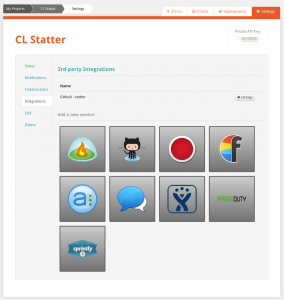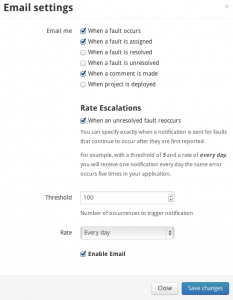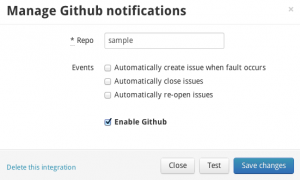Alerts and integrations just leveled up
channels_screencast
Since the beginning, you've been asking for:
-
More integrations with tools like Jira, Sprintly and PagerDuty
-
A richer and more granular system of alerts
Well, my friends, today you have them.
We've just shipped a completely re-written notification system. Not only does it work with more 3rd party tools, but it gives you an incredible amount of control over your alerts.
New Integrations
Honeybadger now works with the following tools:
-
Github Issues
-
Jira
-
PagerDuty
-
Asana
-
Sprintly
-
Pivotal tracker
-
Flowdock
-
Campfire
-
Hipchat
Internally, we’ve made it much easier for us to integrate with 3rd party tools, so expect to see more.
Automatic error escalation
Sometimes your app really breaks. It may only be throwing one error, but it's throwing it 10,000 times an hour.
Wouldn't it be nice to be alerted of that? Now you can be. Here are a few examples:
-
Get an extra email when your app has 100 errors / hour
-
Get a text message when you hit 1000 errors / hour
The rate is configurable by you.
Keep everybody in the loop
With the new system, you can set alerts for almost anything.
-
The app is deployed
-
An error happens (duh)
-
An error is resolved or unresolved
-
Someone comments on an error
-
...and more
Flexible routing system
In the past you could only get some alerts by email. Now all alerts are available on all the channels.
For example, you can set up Honeybadger to:
-
Post to campfire when your app is deployed
-
Send you a text message when someone assigns an error to you
-
Email you when an error is marked resolved
Automatic ticket creation / sync
You might use a tool like Github Issues to manage your team. Now you can have Honeybadger create issues automatically when errors come in. When you resolve an error, it can close the issue. And if the exception happens again, we can re-open the issue for you.
Customizable per-user
Possibly the best thing about these new features is that they can be customized on a per-user basis.
-
If you’re a manager, you can set email alerts to tell you about Deploy events and high error rates.
-
If you’re a developer, you can get all the alerts.
Your whole team can keep an eye on the system, at the level that makes sense to them.

Written by
Starr HorneStarr Horne is a Rubyist and former Chief JavaScripter at Honeybadger. When she's not fixing bugs, she enjoys making furniture with traditional hand-tools, reading history and brewing beer in her garage in Seattle.


